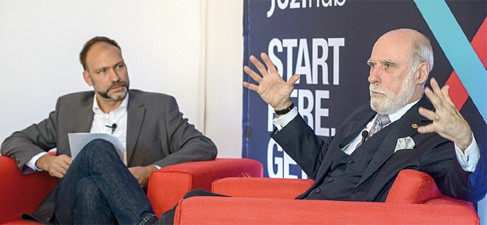
A small piece of South African Internet history recently played itself out alongside the seemingly fanciful plans for an interplanetary data network. These topics were raised by Internet pioneer Vint Cerf in a 'fireside chat' hosted at the JoziHub during his visit to the country recently.
Cerf is acknowledged for his early work in developing the data transfer standards and protocols that make the Internet work. Today, he is, appropriately, a vice-president and chief Internet evangelist at Google.
He's no stranger to SA and visited the country for the first time in 1974 when he was demonstrating the nascent Arpanet that was renamed the Defence Advanced Research Projects Agency (Darpa), which has evolved into the Internet backbone we know today.
Cerf's visit 40 years ago was also inadvertently the catalyst that set SA down the road to a semi-deregulated telecoms market.
This part of the tale is told by Gert van der Veer, a former CEO of South African Airways in the 1980s, but an engineer at the SA Railways when Cerf made his visit.
The telecoms industry was then even more constricted by inflexible regulations and a monopolistic outlook than now. This had the potential to derail the demonstration of the Arpanet's capabilities. The meeting in 1974 was hosted under the auspices of the International Federation of Information Processing to try to win over more converts to this global network of computers, which, at the time, consisted of only a handful of machines.
The major obstacle was that the telecoms infrastructure was tightly regulated and did not allow for third-party transmission over any lines leased from the SA Post Office, which controlled the country's telecoms infrastructure at the time.
"We used this meeting to demonstrate the Arpanet's capabilities to the head of the Post Office, with Cerf in attendance, and we told him what the future would look like. That led to the Post Office Act being changed so that data networks could start and you were allowed to share lines and network packets. We have Vint Cerf to thank for that," Van der Veer says.
I had always hoped this would trigger some serious thinking and the evolution of networking in this country.
Vint Cerf, Google
Cerf adds that although the concept of a global network of linked computers was still in the embryonic stages, it was important to him to promote the network in territories such as SA to help drive wider participation. "I had always hoped this would trigger some serious thinking and the evolution of networking in this country," he says. It would seem he had adopted the role of Internet evangelist long before the Internet and the moniker were born.
Failure is experience
Using his experience within Darpa as a benchmark for the role government could play in driving technological development, Cerf believes a lot more should be done by government agencies.
"Government investment in research is very important," he says. "For one thing, it can tax successful businesses using that technology. But what is really important is that, if you have a really hard research problem that no business will go after because it's too risky, government can actually afford to do that. And that is what Darpa does. Importantly, the results from an investment can rapidly translate into the academic sector, and then move into industry."
He cites the example of Stanford University students entering the workplace and demanding access to e-mail, a service they had become dependent on but that was not widely available in the commercial world.
Turning to the opportunities that start-ups are continually unveiling as they apply technology to new and exciting purposes, Cerf maintains that companies and societies would benefit from adopting the Silicon Valley attitude to such start-ups.
"The idea that failure is experience is very important. The first business you start may not succeed, but you better learn something from it. Don't keep making the same mistakes.
"In Silicon Valley, it's important to know how things can fail, how you can detect that you're on the wrong road, and how you might actually be able to respond to that."
Cerf has been involved in a fascinating project that draws on these experiences - the creation of an interplanetary network that would enable better and faster communication with remote space vehicles such as the Mars rovers.
As in the past, Darpa has been instrumental in enabling this research, as have other agencies such as NASA. Cerf says a whole new suite of protocols has been developed that is currently going through the process of standardisation and adoption by the space community.
Interplanetary communication
"So we have a nascent interplanetary backbone in operation. If any nation launches a new spacecraft, they can use these protocols and we can repurpose that spacecraft when it's done with its primary scientific mission to become a node in the interplanetary backbone. So, we hope that, over time, we'll grow a new interplanetary backbone in order to support space exploration."
Given his success in building a tool such as the Internet that has, for the most part, withstood 40 years' of change, it can only be hoped that the same success will be found in the plans for interplanetary communication and that Skype calls to Mars will be as everyday as calling family that lives abroad.
First published in the November 2013 issue of Brainstorm.
Share